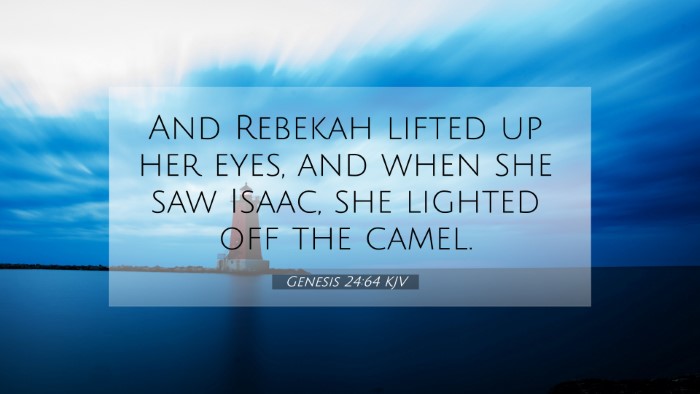Understanding Genesis 24:64
Verse: "And Rebekah lifted up her eyes, and when she saw Isaac, she lighted off the camel."
Summary of Genesis 24:64
Genesis 24:64 captures the pivotal moment when Rebekah first sees Isaac, embodying a blend of surprise, recognition, and anticipation. This verse signifies a transformative encounter marked by emotional and spiritual significance, revealing the fulfillment of God's promise in bringing Isaac a bride through divine providence.
Commentary Insights
Matthew Henry: Henry emphasizes the narrative's importance in God's plan, highlighting Rebekah's immediate reaction upon seeing Isaac. He notes that her descent from the camel symbolizes humility and readiness to embrace her new role. The encounter illustrates the culmination of trust in God's guidance seen throughout the servant's journey.
Albert Barnes: Barnes interprets this verse as a moment indicating Rebekah's beauty and virtue. He remarks on the cultural practice of women covering themselves, implying that the lifting of her eyes signifies recognition of God's provision. Barnes emphasizes the correspondence between divine timing and human relationships, notably in the context of marriage.
Adam Clarke: Clarke offers a detailed socio-historical context, stressing the emotional gravity of this first meeting. He discusses Rebekah's choice to dismount, which not only reflects her poise but also a significant act of agency. Clarke suggests that this encounter foreshadows the profound love they would share, underpinning the overarching themes of faith and trust in God's orchestrations.
Thematic Connections
This verse is rich in thematic symbolism, capturing elements of divine guidance, love, and the fulfillment of God's promises. Here are some thematic Bible verse connections:
- Divine Guidance: Proverbs 3:5-6 - Trust in the Lord for direction.
- Fulfillment of Promises: Genesis 12:3 - God’s promise to Abraham being realized.
- Beauty of Relationships: Song of Solomon 2:10 - The love and attraction in relationships.
- Preparation and Purpose: Jeremiah 29:11 - God's plans for our futures.
- Humility and Servitude: Philippians 2:5 - The value of humility in interaction.
- Significance of Choice: Joshua 24:15 - The importance of individual choices.
- Wait on the Lord: Isaiah 40:31 - The beauty of waiting for God’s timing.
Bible Verse Cross-References
Cross-referencing enhances understanding of the Bible by establishing connections between its verses. Here are specific Bible verses that relate significantly to Genesis 24:64:
- Genesis 24:58 - Rebekah's willingness to go with the servant.
- Genesis 25:20 - The context of Isaac's family background.
- Genesis 29:9-12 - Jacob's encounter with Rachel, paralleling Isaac and Rebekah's timeless love story.
- Genesis 28:2-4 - Isaac's blessings and God's promises regarding lineage.
- Ruth 1:16-17 - The theme of loyal commitment, as seen in Rebekah's actions.
- Matthew 1:2-16 - The genealogical connection between Isaac and Jesus Christ.
- John 4:14 - Living waters as a metaphor for acceptance and spiritual nourishment.
Conclusion
Genesis 24:64 serves as a remarkable illustration of divine orchestration in human relationships. By understanding this verse through the lenses provided by traditional commentaries and its connections to other scripture, one can appreciate the depth of God's faithfulness and the beauty of His timing in bringing individuals together. The interplay of faith, choice, and divine guidance resonates throughout the scriptures and invites readers to explore inter-Biblical dialogues that support understanding of this critical moment.
Exploring Cross-References
If you seek to dive deeper into connecting themes and understand the Biblical narrative more fully, utilizing tools for Bible cross-referencing such as a Bible concordance or a Bible cross-reference guide can be beneficial. These comprehensive materials allow for a systematic approach to cross-reference Bible study, revealing intricate connections between Bible verses that reinforce the messages of faith and divine intervention in our lives.




